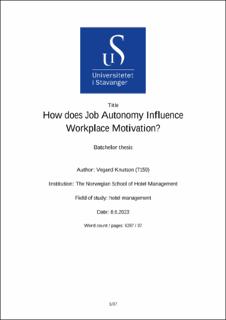| dc.contributor.advisor | Furunes, Trude | |
| dc.contributor.advisor | | |
| dc.contributor.author | Knutson, Vegard | |
| dc.date.accessioned | 2023-07-07T15:51:37Z | |
| dc.date.available | 2023-07-07T15:51:37Z | |
| dc.date.issued | 2023 | |
| dc.identifier | no.uis:inspera:147810336:152729752 | |
| dc.identifier.uri | https://hdl.handle.net/11250/3077151 | |
| dc.description.abstract | To understand job autonomy’s effect on various aspects of motivation, how this motivational effect translates to change in employee behavior and attitudes, and how employers can utilize this information.Motivation is multidimensional, although autonomy is commonly understood as motivating, I wish to provide a deeper understanding of why it motivates and the specific aspects it influences. Systematic literature review that included eight quantitative research articles. A large number of articles that fit the basic criteria were gathered, then a selection process was conducted based on their usefulness to answer my problem statement, the merit of the article and other qualifications I set. The selected articles filtered for findings regarding autonomy’s relation to motivational aspects, and the whole of the articles were analyzed for a better understanding of the context of said findings. My findings indicate that autonomy has a significant role in motivating employees. Granting employees autonomy in their place of work makes them experience a sense of empowerment and ownership, this fosters intrinsic motivation and proactive attitudes. Allowing employees to make autonomous decisions and control their work processes leads to greater engagement and dedication. Autonomy enables employees to align their work to complement their strengths, which enchants their sense of competence and accomplishment. Autonomy contributes to work satisfaction as it creates a deeper connection to the work conducted through a greater sense of ownership. This in turn enhances intrinsic motivation driving employees to improve their work performance. Autonomy was also found to strengthen employee’s emotional attachment to their work and organization, fostering identification and commitment. The freedom to make autonomous decisions makes employees feel more responsible for the outcomes of their work and a greater belief in their capabilities. This creates a sense of competence and responsibility which promotes prosocial motivation. To summarize, autonomy plays a significant role in motivating employees by empowering them, aligning their work with their strengths, enhancing work satisfaction, fostering emotional attachment, and promoting prosocial behavior. | |
| dc.description.abstract | To understand job autonomy’s effect on various aspects of motivation, how this motivational effect translates to change in employee behavior and attitudes, and how employers can utilize this information.Motivation is multidimensional, although autonomy is commonly understood as motivating, I wish to provide a deeper understanding of why it motivates and the specific aspects it influences. Systematic literature review that included eight quantitative research articles. A large number of articles that fit the basic criteria were gathered, then a selection process was conducted based on their usefulness to answer my problem statement, the merit of the article and other qualifications I set. The selected articles filtered for findings regarding autonomy’s relation to motivational aspects, and the whole of the articles were analyzed for a better understanding of the context of said findings. My findings indicate that autonomy has a significant role in motivating employees. Granting employees autonomy in their place of work makes them experience a sense of empowerment and ownership, this fosters intrinsic motivation and proactive attitudes. Allowing employees to make autonomous decisions and control their work processes leads to greater engagement and dedication. Autonomy enables employees to align their work to complement their strengths, which enchants their sense of competence and accomplishment. Autonomy contributes to work satisfaction as it creates a deeper connection to the work conducted through a greater sense of ownership. This in turn enhances intrinsic motivation driving employees to improve their work performance. Autonomy was also found to strengthen employee’s emotional attachment to their work and organization, fostering identification and commitment. The freedom to make autonomous decisions makes employees feel more responsible for the outcomes of their work and a greater belief in their capabilities. This creates a sense of competence and responsibility which promotes prosocial motivation. To summarize, autonomy plays a significant role in motivating employees by empowering them, aligning their work with their strengths, enhancing work satisfaction, fostering emotional attachment, and promoting prosocial behavior. | |
| dc.language | eng | |
| dc.publisher | uis | |
| dc.title | How does Job Autonomy Influence Workplace Motivation? | |
| dc.type | Bachelor thesis | |
